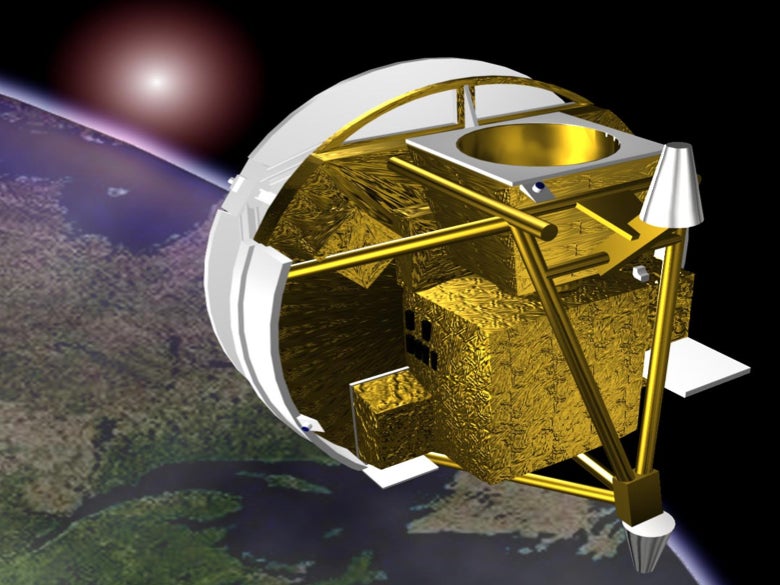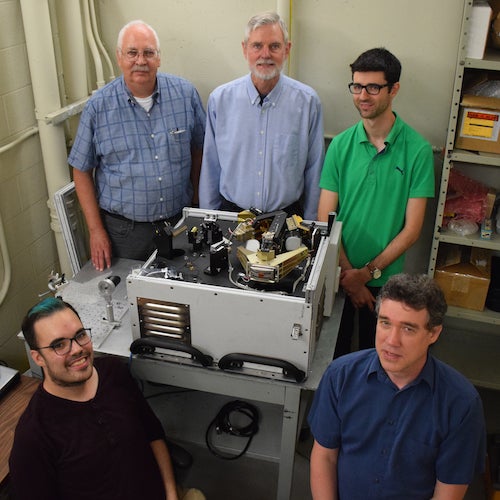Editor:
Brandon Sweet
University Communications
bulletin@uwaterloo.ca
The little satellite that could: ACE at 15

Launched by NASA on board the Canadian satellite SCISAT in 2003, the Atmospheric Chemistry Experiment (ACE) was intended for a two-year mission. Fifteen years later, ACE is still providing excellent spectra that provide vital chemical and physical data about our atmosphere, particularly the ozone layer.
“ACE monitors the global distribution of more than 35 different species including CFCs, hydrochloric acid, and ozone - in other words, nearly all molecules specified by the Montreal Protocol and associated with the Antarctic ozone hole,” says Peter Bernath, ACE Mission Scientist and team lead for ACE’s Science Operations Centre headquartered in the Department of Chemistry at the University of Waterloo. “ACE represents quite an achievement in terms of return on investment, both for science and policy.”
The 1987 Montreal Protocol has been hailed as the world’s most successful international environmental treaty. It phases out the production of chlorofluorocarbons (CFCs) and other substances shown to deplete Earth’s protective ozone layer. ACE is monitoring the decline of these banned source gases in the lower atmosphere and of product gases such as hydrochloric acid in the stratosphere.
“We’re the only ones in orbit doing this, and in real time as a function of altitude,” says Bernath. “You can actually watch the ozone hole forming on our website where we post near-real time data every day.”
ACE is not only known for monitoring the ozone hole; scientists worldwide have published more than 430 papers using ACE data sets. For example, ACE data were used to show how the Asian monsoon directly injects combustion-generated pollution into the upper atmosphere by tracking hydrogen cyanide gas produced mainly by fires.
ACE data were also used to prove solar activity acts as an additional source of atmospheric nitrous oxide in the upper atmosphere. Previously, the only known natural source of nitrous oxide was denitrifying bacteria living in soils at the Earth’s surface. Nitrous oxide is not only an important greenhouse gas; it’s also a powerful ozone-depleting molecule.

The ACE Team poses with a copy of the ACE satellite. Left to Right back: Peter Bernath, Dennis Cok, and Scott Jones; Left to Right front: Johnny Steffen and Chris Boone.
The main ACE instrument was built in Quebec City by ABB and it has vastly outperformed the Canadian Space Agency’s original requirements. However, the satellite itself has no fuel on board. Its orbit is decaying steadily by about 1 kilometre per year. It’s scheduled to burn up in the atmosphere by 2035.
Meanwhile, this science mission continues to evolve and improve. The high resolution spectroscopic data gathered by ACE allows the Waterloo ACE team to forensically identify new species and then quantify their global concentration trends going back the entire 15 years of the project.
“We recently received a request to provide data on two hydrofluorocarbons (HFCs) that are being regulated as part of the 2016 Kigali Amendment to the Montreal Protocol,” says Bernath. “We were able to isolate the signal in the spectra and within a month provide an entirely new data product. The unique algorithms the Waterloo team continue to develop are only possible with this project’s longevity.”
The Waterloo team is also producing cloud data for the upper troposphere, stratosphere and mesosphere. ACE is the first spectrometer to record spectra of polar mesospheric clouds (PMCs), showing these clouds are in fact very small ice particles.
PMCs form at about 90 km above the ground when temperatures are very low. Climate change causes surface temperatures to increase and the upper atmosphere to cool, increasing the occurrence of PMCs. ACE data are expected to provide additional information on climate change.
The Journal of Quantitative Spectroscopy and Radiative Transfer will be publishing a Special Issue in honour of the 15th anniversary of ACE’s launch. For more information and to view the data freely available to the public, visit the ACE website, http://www.ace.uwaterloo.ca/. Additional research products are available upon request.
Peter Bernath is a Research Professor in the Department of Chemistry at Waterloo, professor and Eminent Scholar at Old Dominion University in Norfolk, Virginia, and professor emeritus at University of York in Great Britain. ACE’s Science Operations Centre includes Dennis Cok, Chris Boone, Scott Jones, and Johnny Steffen.
How the Registrar's Office made $45M in OSAP payments in one day
Thanks to a new process for processing Ontario Student Assistance Program (OSAP) payments, Student Awards & Financial Aid (SAFA) disbursed nearly $45 million in OSAP financial aid in one day - and that was before the term even started.
Starting this fall term, OSAP funding will go directly to the University to pay student fees for OSAP recipients, and remaining balances will be deposited to student bank accounts.
After working with Information Systems & Technology (IST) to create a whole new process, SAFA can now disburse OSAP payments to thousands of students with the click of a button, significantly improving accuracy and reducing the time it takes to get OSAP payments out.
Warriors go 2-0 with win against Toronto

This is an excerpt of an article that originally appeared on the Athletics and Recreation website.
The Waterloo Warriors took to the road for the first time this season, and it became instantly apparent that they remembered to pack their high-octane offence.
The Warriors used an explosive 17-point first quarter to seize control early, as they moved to 2-0 on the young season with a 41-18 victory over the Toronto Varsity Blues at Varsity Stadium on Saturday night.
"It was a great team win on a very humid night in Toronto," said head coach Chris Bertoia. "Everyone made a significant contribution to the victory tonight, sticking to the game plan."
Tre Ford followed up his eye-popping stat line in week one with yet another top-notch performance: the second-year pivot completed 21 of 27 passes for 277 yards and four touchdowns, while adding another 67 yards on the ground.
Coming off a week where he tied the OUA record for touchdown receptions in a game, Tyler Ternowskiwas at it again, catching 5 balls for 106 yards and a pair of scores, while Mitch Kernick was on the receiving end of two touchdown throws as well. Gordon Lam didn't crack the endzone, but he was Ford's most frequently looked-to target, making 6 catches for 86 yards on the night.
Blues quarterback Clay Sequeira was the busiest player on either side of the field, completing 31 of a jaw-dropping 47 pass attempts for 361 yards and a touchdown. Sequeira was constantly on the run and flushed out of the pocket all night, but he was able to turn some of those pressure situations into some gains with his feet – the pivot rushed 5 times for 62 yards and a touchdown.
Unlike their season-opening win against Windsor, the Warriors found more balance in the offence in week two, as they outrushed the Blues 212 yards to 84 yards.
Read the rest of the article on the Athletics website.
Arts Undergraduate Office closed Wednesday
The Arts Undergraduate Office will be closed on Wednesday, September 5 for Orientation.
Link of the day
20 years ago: SwissAir Flight 111
When and where
Co-operative work term begins, Tuesday, September 4.
Graduate student orientation, Tuesday, September 4.
Research ethics system training, Tuesday, September 4, 9:00 a.m. to 10:30 a.m., MC 1078. For all upcoming sessions, please visit the Research ethics system webpage.
Lectures begin, Thursday, September 6.
Music Department Ensemble Auditions for Fall 2018, Thursday, September 6 to Friday, September 21, Conrad Grebel University College.
Feds Welcome Week, Monday, September 10 to Friday, September 14.
LGBTQ+ Making Spaces workshop, Monday, September 10, 9:00 a.m. to 12:30 p.m., STC 2002.
Strategic Plan consultation session - Undergraduate Learning, Monday, September 10, 10:30 a.m., Village 1 Great Hall.
Coping Skills Seminar - Challenging Thinking, Monday, September 10, 4:00 p.m., HS 2302.
Strategic Plan Consultation Session - Learning Environment, Tuesday, September 11, 2:00 p.m., Village 1 Great Hall.
Research ethics system training, Wednesday, September 12, 9:00 a.m. to 10:30 a.m., MC 1078. For all upcoming sessions, please visit the Research ethics system website.
Strategic Plan consultation session - Graduate Studies, Thursday, September 13, 2:00 p.m., Student Life Centre Multipurpose Room.
Strategic Plan Consultation Session for graduate students, Thursday, September 13, 5:00 p.m., Village 1 Great Hall.
Strategic Plan Consultation Session - Internationalization, Friday, September 14, 10:30 a.m., Village 1 Great Hall.
Doors Open Waterloo Region, Saturday, September 15, multiple locations on campus.
What Is a City? Interpreting Change in the Urban Landscape, Saturday, September 15, 11:00 a.m., Catalyst137 & Miovision.
Public Lecture featuring Ken McLaughlin, "The Brubacher House: Historic Icon on an Ultra-Modern Campus." Saturday, September 15, 3:00 p.m., Brubacher House Museum.
Application for Velocity Campus Ambassador volunteers closes, “Get swag, immerse yourself in the world of entrepreneurship and attend a startup event at the Velocity Garage,” Sunday, September 16, 11:59 p.m.
Peace Week, Monday, September 17 to Saturday, September 22.
Tri-Agency Scholarships (NSERC, SSHRC, CIHR), Monday, September 17, 10:00 a.m., NH 3407.
NEW - Experiential Learning using Riipen – Fall Information Session, Monday, September 17, 12:00 p.m. to 1:00 p.m., HH 150. RSVP jennifer.nicholson@uwaterloo.ca by Wednesday, September 12.
Alleviating Anxiety Seminar, Monday, September 17, 1:00 p.m., HS 2302.
Strategic Plan Consultation Session - Empowering People, Monday, September 17, 1:00 p.m., Student Life Centre Multipurpose Room.
Communication for the workplace, Monday, September 17, 1:00 p.m., SCH 228F.
Coping Skills Seminar - Strengthening Motivation, Monday, September 17, 4:00 p.m., HS 2302.
Research ethics system training, Tuesday, September 18, 9:00 a.m. to 10:30 a.m., MC 1078. For all upcoming sessions, please visit the Research ethics system webpage.
Developing Your Compassionate Mind, Tuesday, September 18, 1:30 p.m., NH 2447.
Strategic Plan Consultation Session - Leveraging Resources, Tuesday, September 18, 2:00 p.m., Student Life Centre Multipurpose Room.
The Body Project, Tuesday, September 18. 5:00 p.m., HS 2302.
Velocity Science: The Startup Rollercoaster, Tuesday, September 18, 7:30 p.m., Velocity Start, SCH 2nd Floor.
Healthy Workplace Committee Brown Bag Lunch and Learn, Helping Your Child Succeed at School, Wednesday, September 19, 12:00 p.m. to 1:00 p.m., EC5-1111. Space is limited, so please register to attend.
Noon Hour Concert: "Being for the Benefit of Mr. Mason", Wednesday, September 19, 12:30 p.m., Conrad Grebel chapel.
Strategic Plan Consultation Session for undergraduate students, Wednesday, September 19, 5:00 p.m., Village 1 Great Hall.
Velocity Start: What’s Your Problem?, “Larry Smith’s legendary talk on how find and solve “killer” problems,” Wednesday, September 19, 7:30 p.m., Velocity Start, SCH 2nd Floor.
NEW - WISE Public Lecture featuring Jason Jonkman, Senior Engineer, NREL, "The New FAST.Farm: Wind Farm Design & Analysis." Thursday, September 20, 10:30 a.m. to 11:30 a.m., E6 4022.
Grimm Lecture 2018: When would Capitalism end? Thursday, September 20, 7:00 p.m., CIGI Auditorium, Balsillie School of International Affairs.
PhD oral defences
Mechanical & Mechatronics Engineering. Adheel Akhtar, "Nonlinear and Geometric Controllers for a Class of Robotic Vehicles." Supervisor, Stephen Waslander. On display in the Engineering graduate studies office, DWE 3520C. Oral defence Wednesday, September 12, 1:00 p.m., E5 3006.
Psychology. Alex Huynh, "Uniquely Diverse: Ethnic Diversity and Interethnic Contact Predict Individualistic Values and Behaviour." Supervisor, Igor Grossmann. On deposit in the Arts graduate office, PAS 2434. Oral defence Thursday, September 13, 1:30 p.m., E5 3052.
Chemistry. Matthew Schmidt, "Path integral ground state approaches for the study of weakly bound clusters and confined molecules." Supervisor, Pierre-Nicholas Roy. On deposit in the Science graduate office, PHY 2013. Oral defence Thursday, September 13, 2:30 p.m., C2 361.
Civil & Environmental Engineering. Sabah Fartosy, "Non-Destructive Evaluation of Damage in Concrete of Shallow Foundations." Supervisors, Giovanni Cascante, Dipanjan Basu. On display in the Engineering graduate studies office, DWE 3520C. Oral defence Friday, September 14, 9:00 a.m., E2 2350.